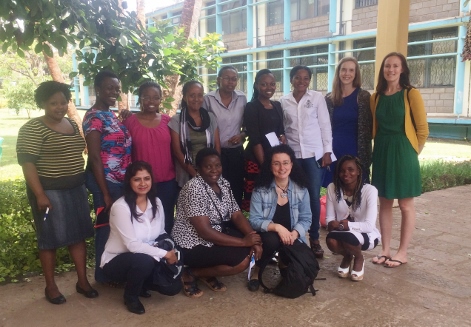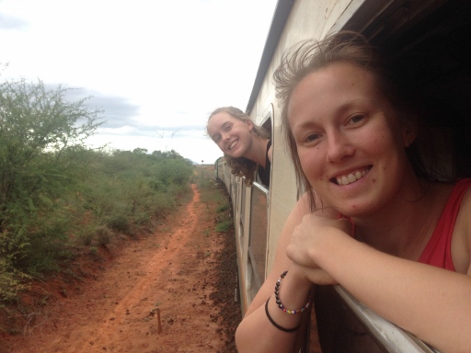Women in science in Kenya
Ida Essner and Sara Hesse did their Minor Field Study in collaboration with ISP partners at Department of Physics and the Institute of Nuclear Science & Technology at University of Nairobi, Kenya on factors behind the gender representation in technical higher education.

Ida and Sara (far right) together with MSc students from the Department of Physics.
Where did you go and what was your research subject?
We went to Nairobi, Kenya to look at reasons behind the gender representation in technical higher education (MSc level and up) at University of Nairobi. Women are a clear minority in technical educations at this university, as well as at many others. With the field studies we wanted to look at the obstacles women in science face when pursuing higher educations, hoping to answer why there are fewer women than men in technical higher educations at University of Nairobi. We choose Kenya because it is a politically safe and an interesting country regarding gender equality. The government has passed a number of gender equality laws including, among other things, gender quotation and extra admission points for women entering the university.
Did you reach any interesting results?
We came to the conclusion that one factor hindering women from pursuing science and technology education is the cultural expectations. Science is considered to be a masculine subject reserved for men, something that appear to emerge in the attitudes of boys and girls at an early age. It is also common that early childbirth hinder women from continuing to higher levels in academia, because women often have the dual work load and responsibility of family and household. The cultural norms and expectations of the Kenyan women also consider it to be more important to get married and create a family than to seek self-fulfillment trough pursuing own interests.
What would you say are the most important experiences from your time in the field?
It was very interesting and important to be the deviating norm, we didn’t really fit in anywhere and everything we did was wrong basically. We tried really hard but could never get anything right. Despite that we think it is important to spend time with the locals to get a deeper insight in the culture. Regarding the field work it is important to set the expectation with the people you are working with, so you have the same view of what the end result will be. We also learnt that the concept of time efficiency as we know it in Sweden does not always exist in Kenya, so be flexible in your planning.
Do you recommend others to apply for a MFS grant? Why?
Definitely! It is a great experience to see something new and get different perspectives. You learn a lot experiencing a different culture during such a long period of time.

The train ride that supposed to take 15 hours, ended up taking 30.
More information
Name: Ida Essner och Sara Hesse
University: Uppsala University
Field of study: Sociotechnical Systems Engineering
Level of thesis: Master
Period and year of MFS: Spring 2016
The MFS was awarded from the Department of Social and Economic Geography, Uppsala University but the work was carried out in collaboration with ISP supported physics groups at University of Nairobi.
Read the MFS thesis: More than a technical issue for women in science
